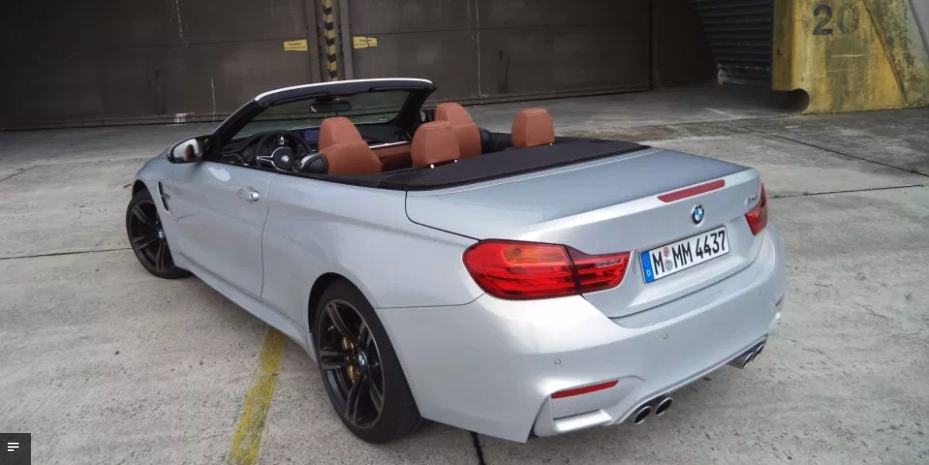First Drive: 2015 BMW M4 Cabriolet

Story and photos by John LeBlanc
MUNICH, Germany — Those who love irony will relish in BMW’s new 2015 M4 Cabriolet. Just like its four M3 Cabriolet predecessors, the BMW employs all the usual go-fast goodies from the German automaker’s famed high-performance M GmbH division but then adds a “mute” button by being a heavier, open-top model.
As before, the new M4 Cabriolet is based upon a 2+2 two-door BMW hardtop. In this case, the just-released M4 Coupe (the “4” indicating the new nomenclature for what BMW used to call its 3 Series two-doors).
Like the new M4 Coupe and M3 Sedan, the Cabriolet wears aggressively aerodynamic bodywork, sports a tarmac-gripping suspension, powered by a stunningly refined, yet powerful, 425 horsepower and 406 pound-feet of torque turbocharged six-cylinder gas engine, putting its power to the road via the Bimmer’s rear tires only.
The irony? Well, despite the new M4 Cabriolet benefiting from all the structural upgrades and generous use of lighter carbon-fibre and aluminum parts also employed on the M4 Coupe, the Cabriolet is heavier, and its body is less stiff, mildly diluting all the best efforts from the M division engineers.
While autumn-like weather greeted us on the morning of our one-day media drive event that had us piloting the new M4 Cabriolet from BMW’s Munich-based Driving Academy across the German-Austrian border into the Alps just northwest of Innsbruck, the sun eventually broke out enough to power down the M4 Cabriolet’s top.
Ah yes — the intricately engineered folding metal hardtop. It’s the primary reason a buyer would pay the extra $9,500 over the current M4 Coupe’s $76,095 (all prices include freight and pre-delivery inspection fees) starting price.
While BMW has gone to great lengths in upgrading the new M4 over the last M3 convertible, the Cabriolet’s roof architecture is essentially the same. With the touch of a button, the metal top folds in three parts and takes only 20 seconds to drop.
The new M4 Cabriolet’s cabin also wears all the M4 hardtop’s M-specific bits, including its lightweight sport seats. When the top is up, there’s 370 litres of trunk room – about 20 L more than the last M3 Cabriolet.
And like other 4 Series Cabs, the hardtop features some design improvements that lower cabin noise levels, including a sound-absorbing headliner that reduces wind noise by up to two decibels in comparison to the M3 convertible. And the rear seats fold for a relatively wide opening, with a smaller pass-through if you want to carry a pair of rear passengers and something long, like skis, at the same time.
If you ignore the multiple M badges, from the driver’s seat, the most powerful 4 Series Cabriolet can be a luxurious and comfortable grand touring car. So much so, it arguably makes the little bit larger but a lot pricier $130,995 BMW M6 2+2 Cabriolet redundant. And if you’re into power-to-weight ratios, I suggest you turn away when the M4 convertible hits the scales.
Because while BMW quotes a curb weight of 1,839 kilograms for its new four-passenger convertible — 41 kg less than the M3 Cab — that’s still 250 kg more than the new M4 Coupe. And you don’t need to be a BMW engineer to know that extra avoirdupois means a comparable drop in performance.
According to its maker, the M4 Cabriolet will scoot from zero to 100 km/hr in just 4.6 seconds when using its six-speed manual transmission; 4.4 with the seven-speed M Double Clutch Transmission. Plenty quick. However, no matter if you shift for yourself or not, that means the open-top M4 is 0.3 seconds slower than the hardtop M4 Coupe.
Subjectively, some former M3 Cab owners will miss that model’s mellifluous V8. Although the M4’s new twin-turbocharged 3.0-litre straight-six howls like a hungry wolf, revving to its 7,600 revolutions per minute limit willingly, at lower revs the BMW’s exhaust rattles like someone back at the factory forgot to tighten a bolt.
The original BMW M3 was born to compete in German touring car races. And even the latest M4 Coupe can be used as a track day weapon. But the convertible M4, er, not so much.
Indeed, my M4 Cabriolet’s fat and optional 19-inch rubber allowed for gobs of grip while cornering. And with the Adaptive M Suspension, twin-turbo six and dual-clutch autobox set to their respective sportiest settings, the BMW convertible is swift to dispatch doddlers in the left lane of the autobahn and on back road switchbacks.
But even with its roof tucked away, sensitive drivers will feel its 70 kg weight behind their shoulders. And although the open-top M4 uses the same electrically assisted power-steering system as the M4 Coupe and M3 Sedan, the Cabriolet’s helm responses are less vibrant, and the body vibrates a bit over rough pavement.
I should say, though, the dynamic differences between the M4 Coupe and M4 Cabriolet are admittedly small. But then, the expectations set by the BMW M gang are high. And the positives of being able to hear the wail of the BMW six better AND enjoy a bit of the wind in our your hair; obviously qualities the hardtop M4s are bereft of.
In the end, the new 2015 BMW M4 Cabriolet is just as ironic as every one of its previous M3 Cab ancestors.





![[del.icio.us]](https://www.straight-six.com/wp-content/plugins/bookmarkify/delicious.png)
![[Digg]](https://www.straight-six.com/wp-content/plugins/bookmarkify/digg.png)
![[Facebook]](https://www.straight-six.com/wp-content/plugins/bookmarkify/facebook.png)
![[Google]](https://www.straight-six.com/wp-content/plugins/bookmarkify/google.png)
![[Reddit]](https://www.straight-six.com/wp-content/plugins/bookmarkify/reddit.png)
![[StumbleUpon]](https://www.straight-six.com/wp-content/plugins/bookmarkify/stumbleupon.png)
![[Twitter]](https://www.straight-six.com/wp-content/plugins/bookmarkify/twitter.png)
![[Email]](https://www.straight-six.com/wp-content/plugins/bookmarkify/email.png)